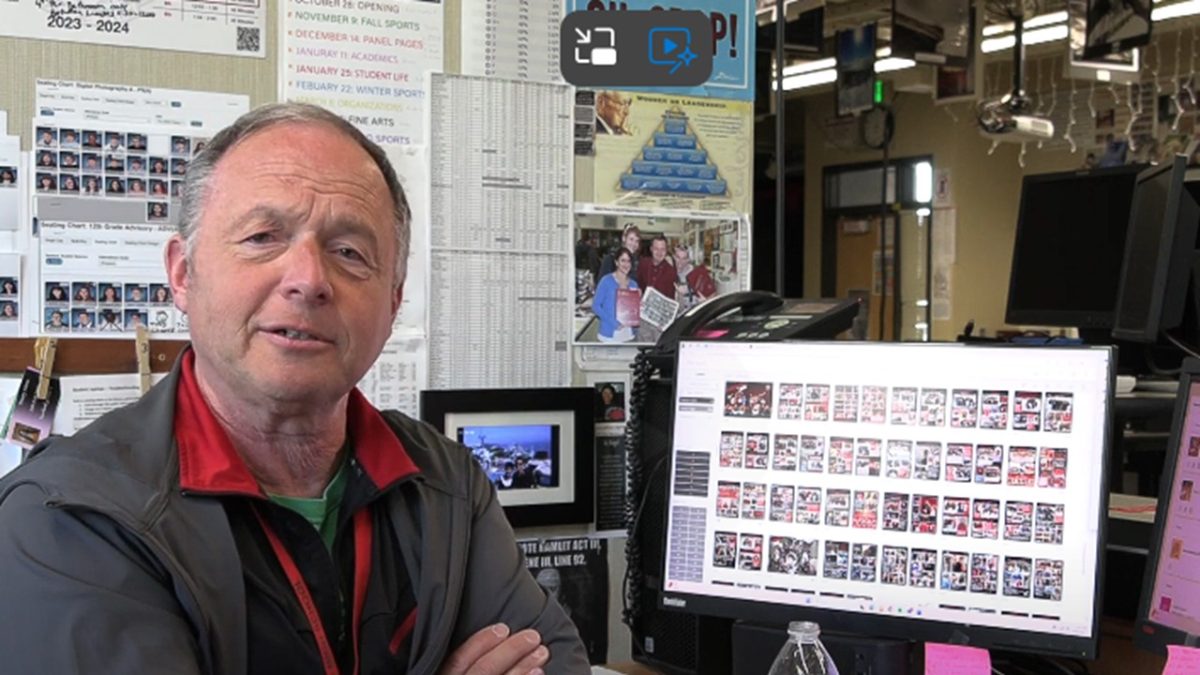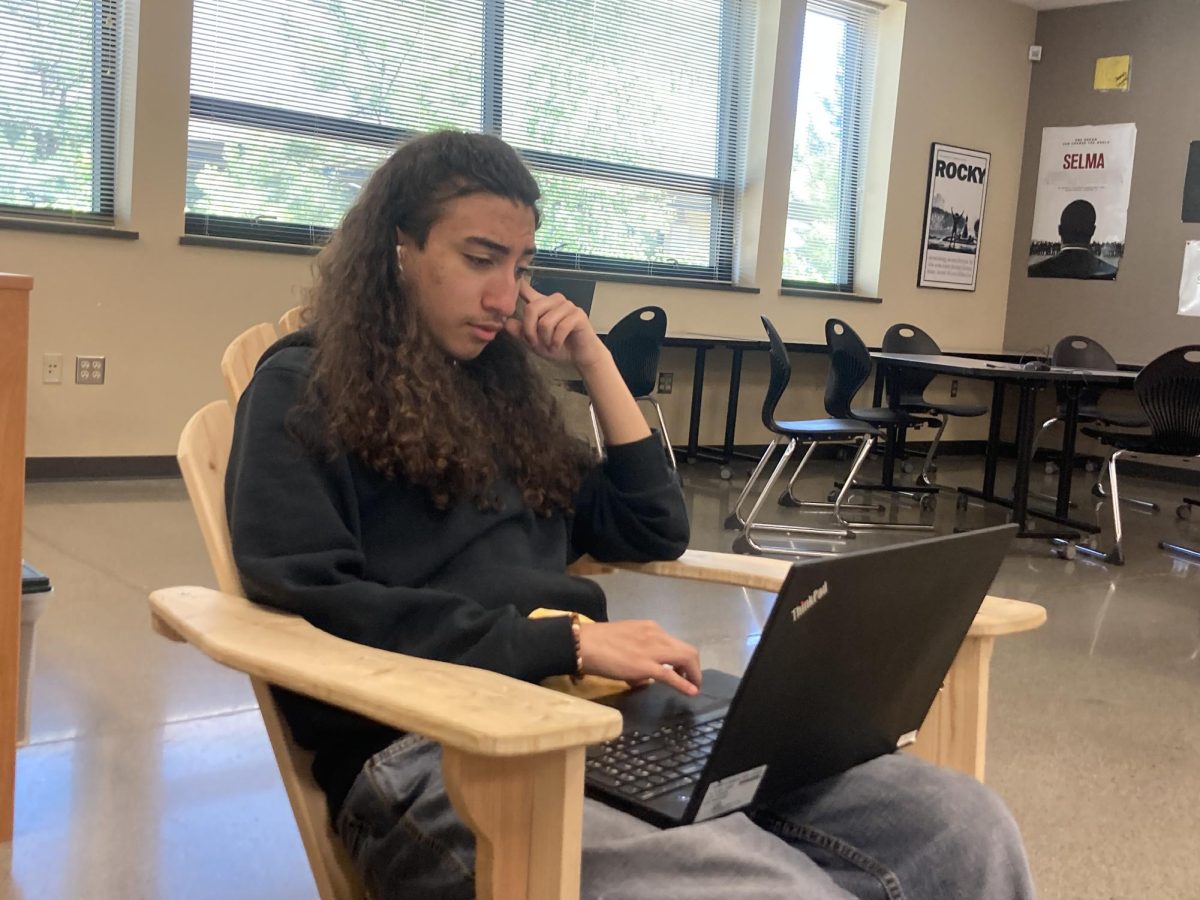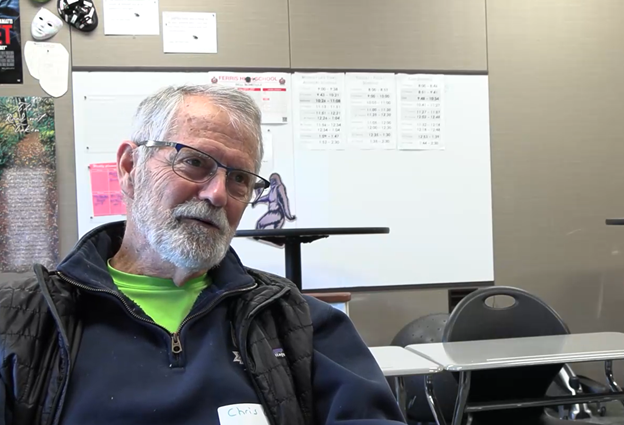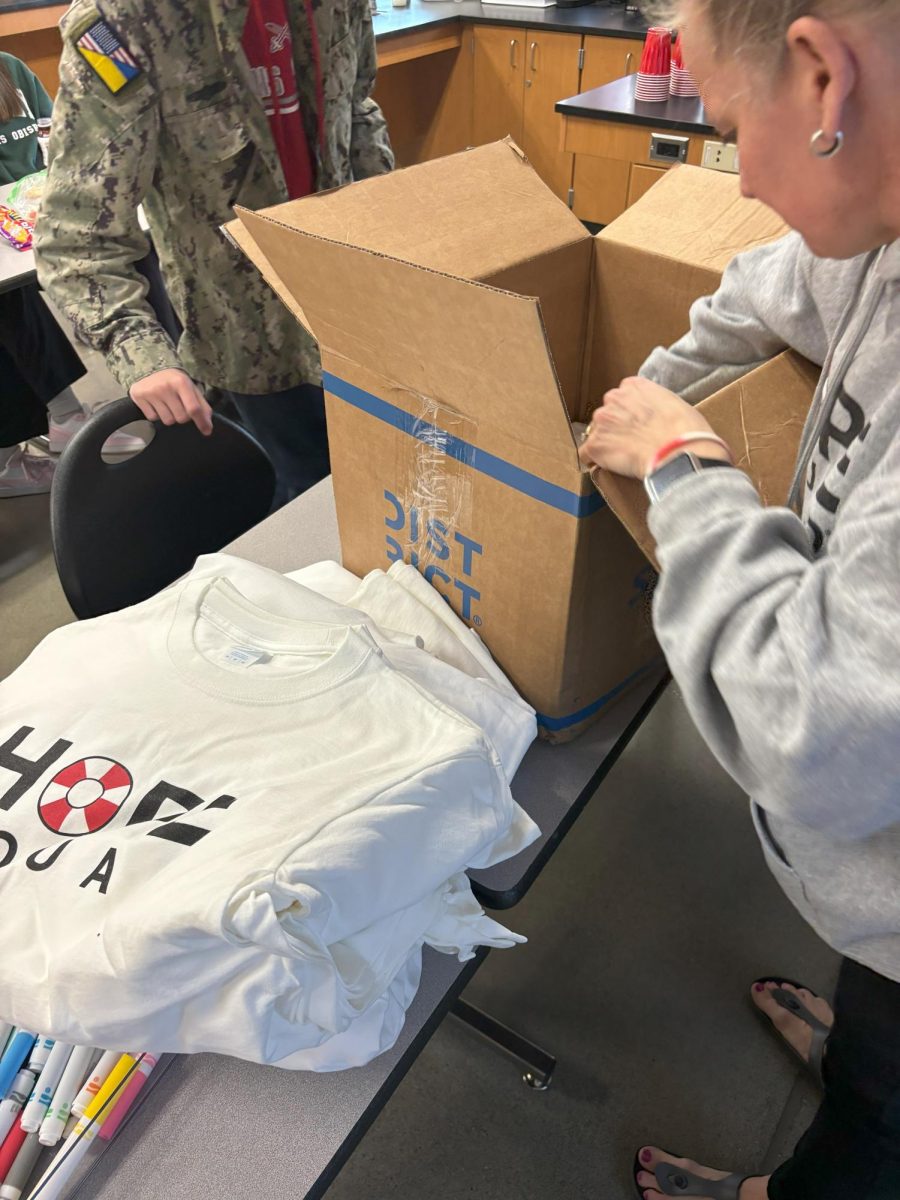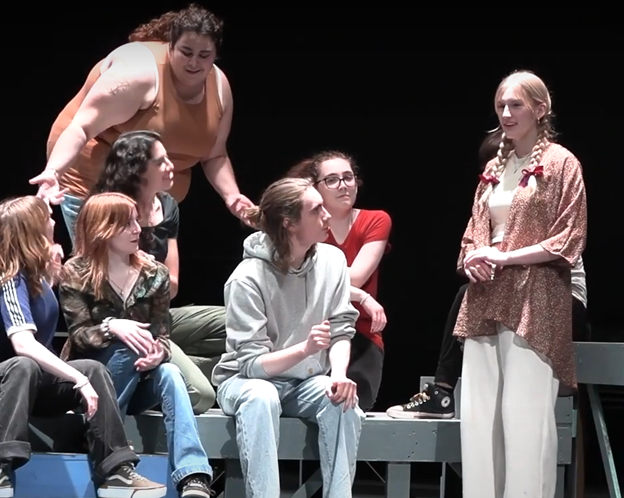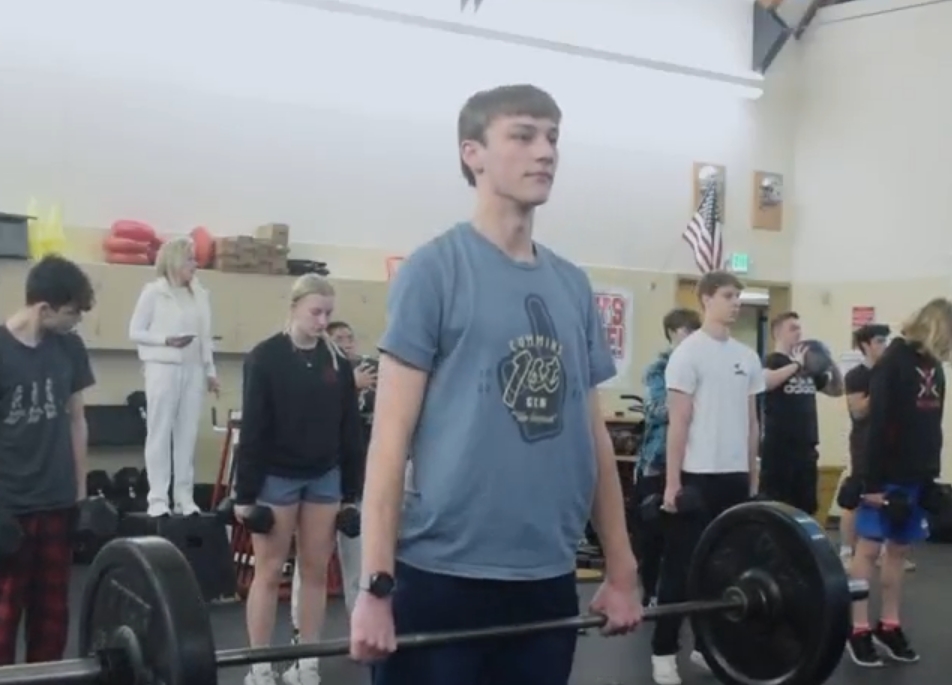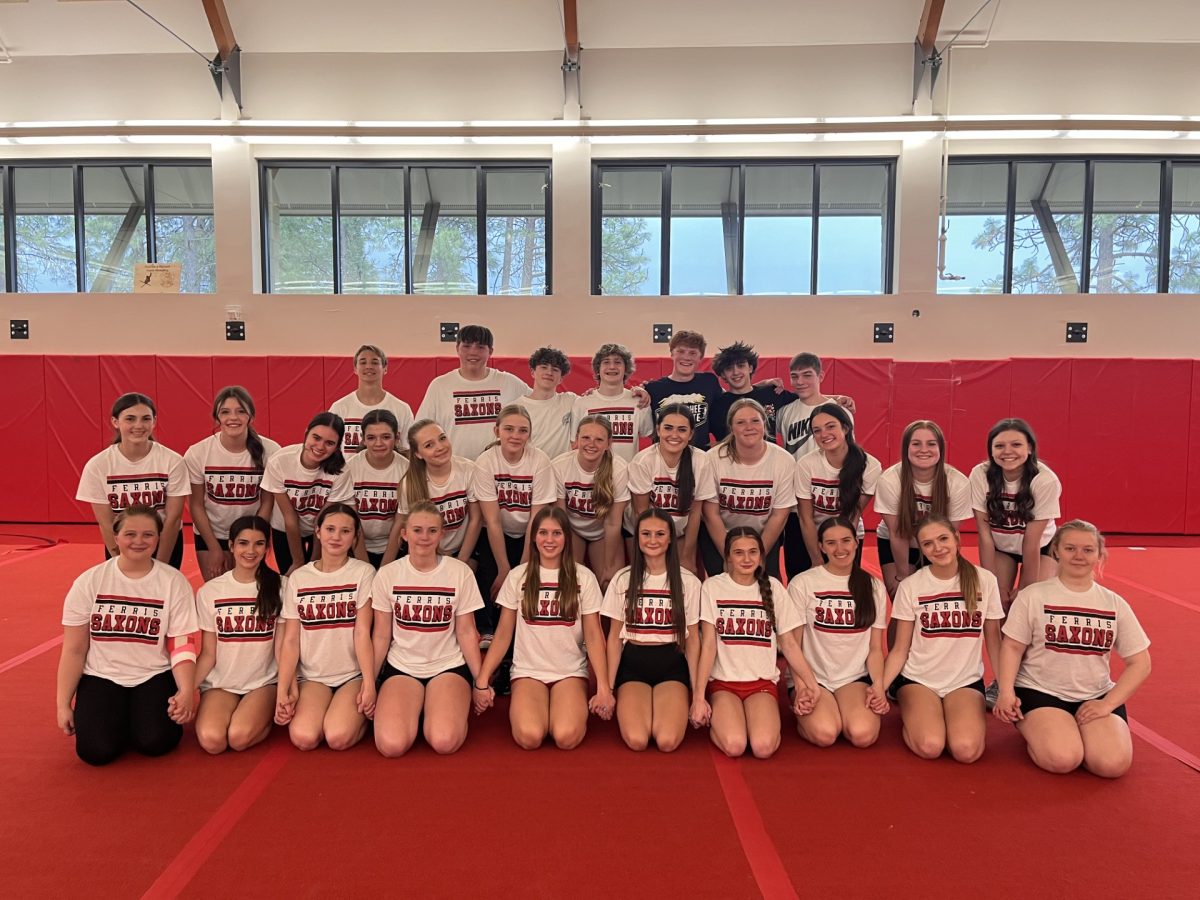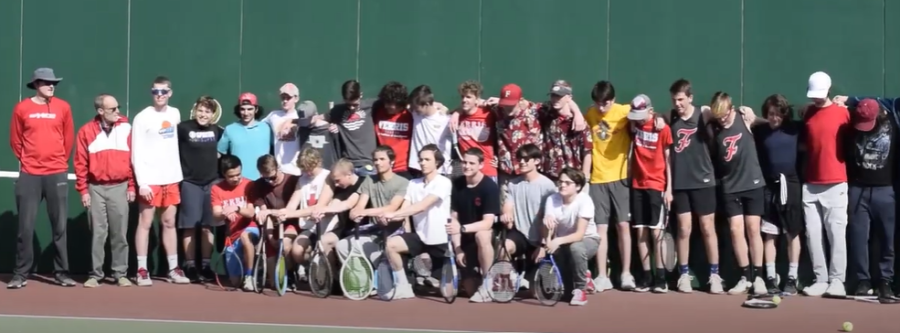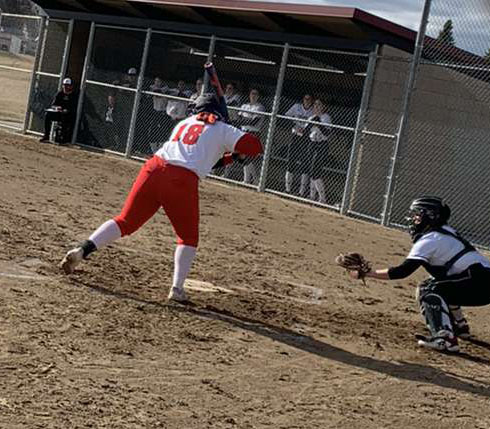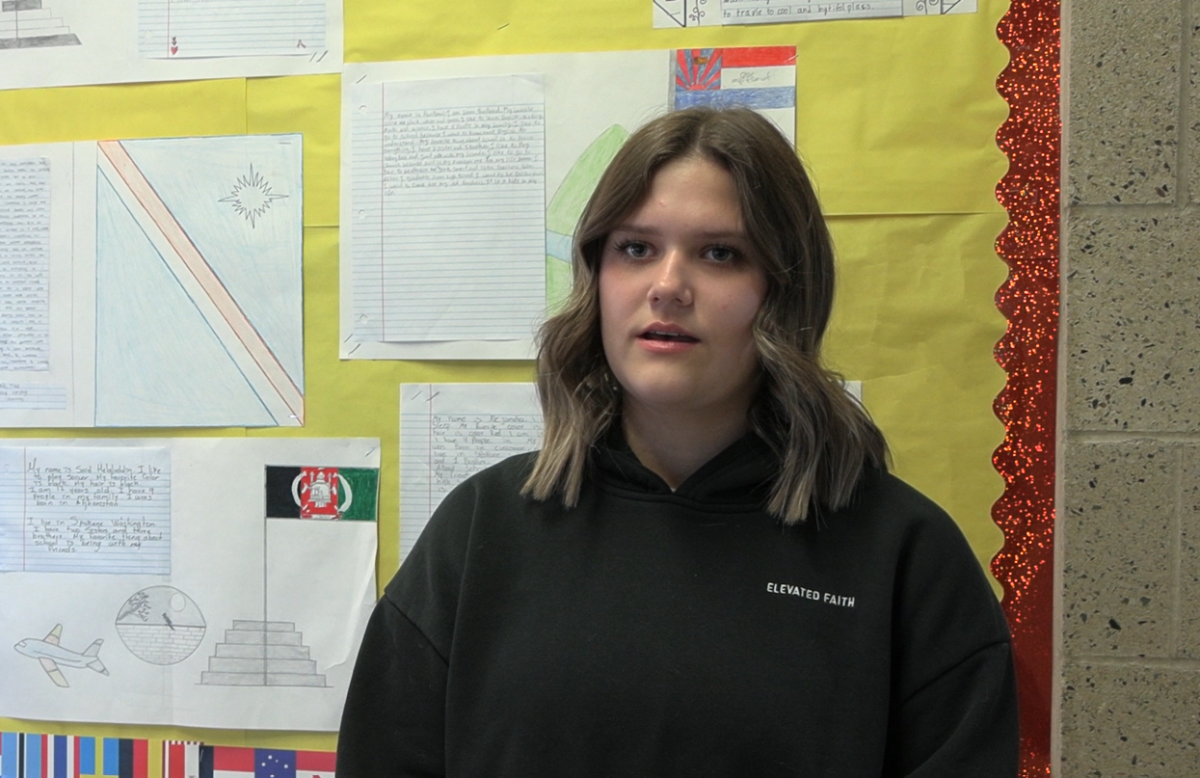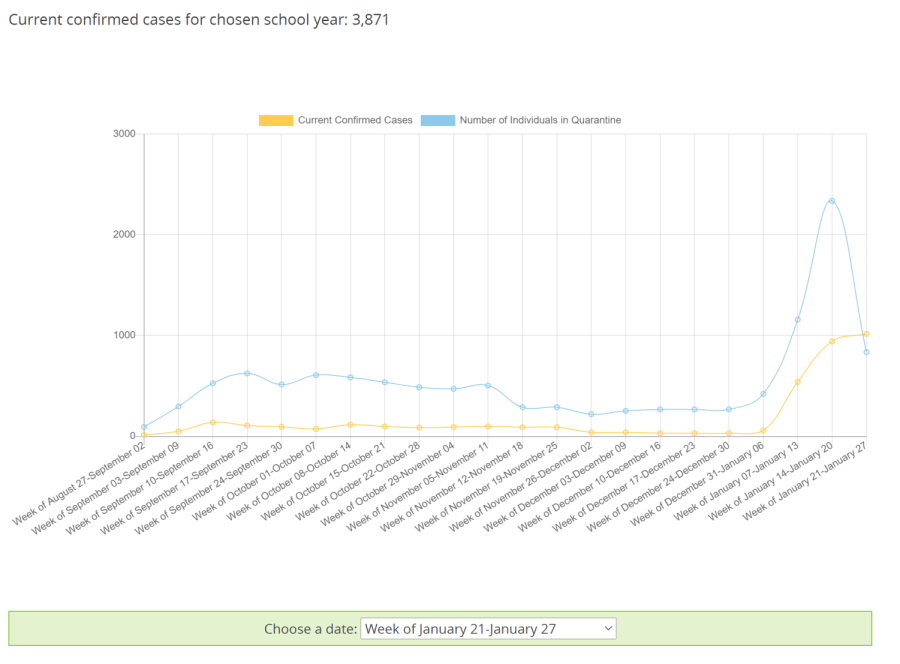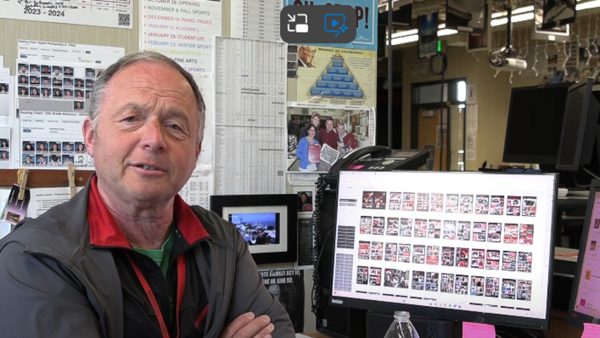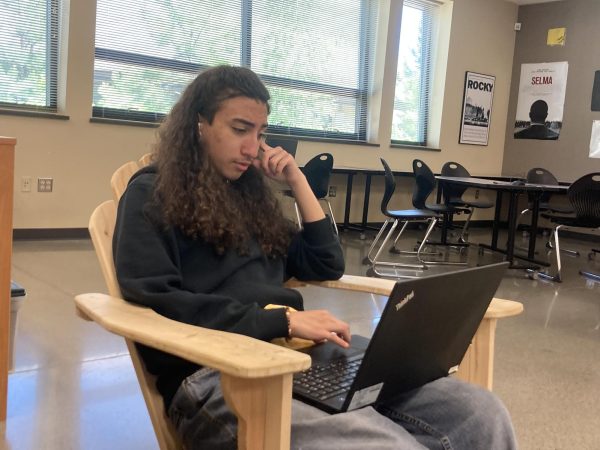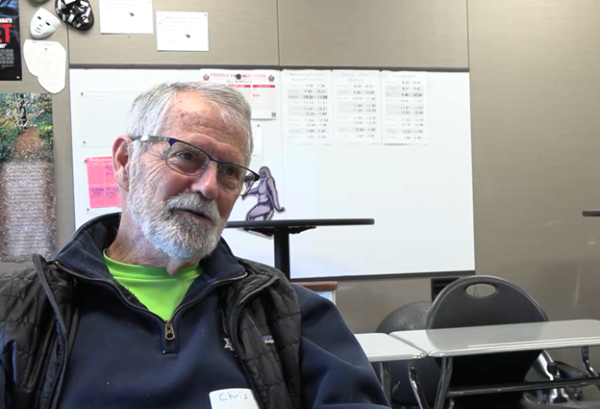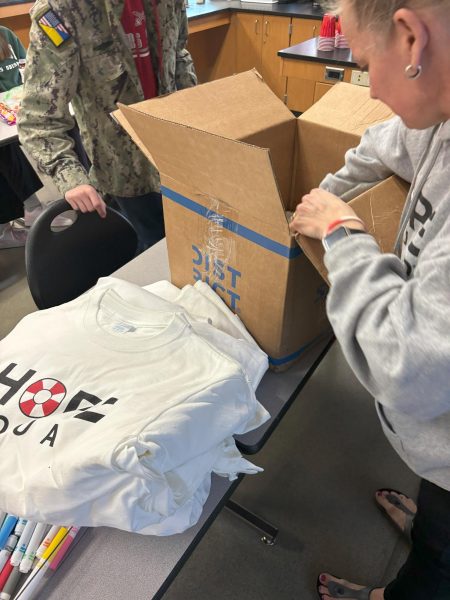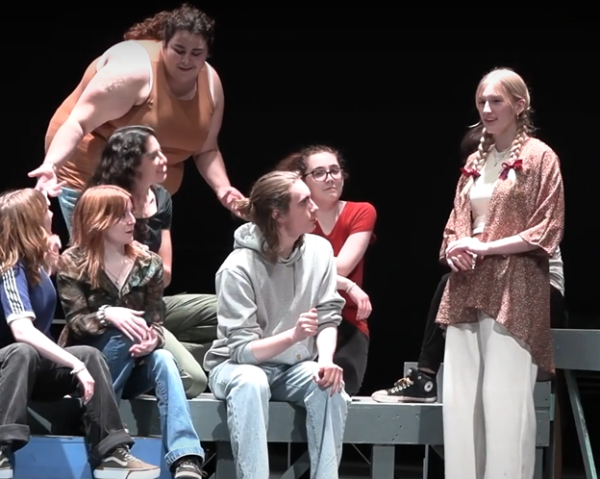Second Semester and COVID-19: It’s Not Over Yet, But We’ll Be Okay
January 31, 2022
Despite being back in school with a day-to-day schedule, this year is still anything but normal. With new variants popping up and more students and staff having to quarantine each week, COVID-19 is still a large part of everyone’s lives here at Ferris. One person at Ferris who understands this more than anyone is the school nurse, Nurse Patti Case.
“Well, I would say the first wave was not too bad. You know, we all went through the beginning of COVID, which was pretty devastating; everyone being isolated, not being in school. And then we came back. It wasn’t too overwhelming, not a horrible amount of cases. Then Delta hit, and it got worse. That was pretty difficult; that was pretty severe. But now the Omicron has been the worst, and some of the schools in the area are shutting down, even some classes in our district are shutting down, and some sports events. It’s starting to hit home a lot more severely right now,” Case said.
No matter how many variants are present, our school was and is prepared to keep us safe. The plan the nurse follows with possible COVID-19 cases leaves little room for error.
Case said, “If I think someone might have COVID, normally if they have at least one symptom, then they are sent home, and we watch that symptom for 24 hours. Then, if the symptom continues, they are required to get tested, or if they develop more than one symptom, they are definitely required to get tested for that.”
According to the Spokane Schools website, all staff and students should stay home if they are symptomatic. If they test and it comes back negative, they are allowed to return to school so long as they have no fever for 24 hours prior and their symptom(s) improve. If they do not test, they are required to isolate for five days and return on day six. If an individual tests positive, they are to isolate five days from symptom onset (day zero) or the day they tested positive if they are asymptomatic, returning on day six if they have no fever for 24 hours and have symptom improvement.
No matter how cautious the school is, however, the staff at Ferris are kept busy with symptomatic students, especially the nurse.
“It’s really picked up right now. I would say about three or four in ten. Right now, I don’t know what my numbers are, but prior to COVID on a really busy day, I would see about 20 kids, and it would just be a variety of things. I still have a real variety of injuries and illnesses, but right at the moment, this week I’ve probably seen about four kids a day with symptoms, and that’s just the kids, you know, from the kids that are here. There’s just a lot of kids out right now as well,” said Case.
Staff aren’t the only ones who notice the effect that COVID-19 is having on our school. Students see the differences between an ordinary school year and this one. Despite this year having a typical schedule for students, that seems to be one of the only average parts of this year.
“COVID has affected my learning kind of by like, I used to be a really visual learner but now if you tell me how to do it, let me do it on my own, and then I’ll ask, ‘Is this right?’ I guess it’s kind of like made me ask questions more to make sure that I’m doing everything right because back when we were online, I was afraid to ask questions, and I ended up not doing so well on certain assignments and stuff like that,” said freshman Chloe Perez-Leyba.
While many students find that, after online learning, they have developed a whole new way for them to learn, it’s not the only issue students face. Others struggle to communicate with their teachers more than they used to thanks to the masks.
Sophomore Jax Thomas said, “This year, it’s made it kind of hard when it comes to being able to connect with teachers and other students. When it comes to connecting with teachers specifically, it’s made it harder to have open conversations with them about my schedule, my assignments, and what I need help with, because if I’m not comfortable with a teacher, it is hard to ask for help.”
The pandemic has not only affected students learning, but also their social lives. For many students, going to school is a way to see their friends and socialize. Now, with masking and social distancing, students are finding it hard to talk with their friends.
Perez-Leyba said, “Honestly, I did find it kind of hard to find new friends and stuff with the whole masks thing because like, I don’t know, it’s just … it’s hard. Honestly, masks aren’t really the problem, it’s just like I used to be able to recognize certain people but now it’s just like people can recognize me and I’m just like, ‘Sorry, who are you?’ Like, I don’t remember them, and then they’ll be like ‘Oh I’m so-and-so,’ and I’m like ‘Oh my god hi.’ I don’t really recognize half the people that I used to know; you know.”
For freshmen, who are just starting their high school experiences, as well as sophomores who didn’t really have a chance to make new friends last year, the struggle to find new friends is even harder.
“COVID has affected the social aspect of high school for me just making new friends. Keeping the same friends has been fine but trying to reach out to someone who constantly has to be six or three feet away from you. Everyone seems in their own bubble, and you don’t want to disturb the bubbles,” said sophomore James Fischer.
In mid-August 2021, Governor Inslee announced that all K-12 students and staff are required to wear face coverings in Washington schools. Although the mask mandate seems to be a considerable factor in the struggles Ferris students are currently facing, they agree that masks are important in slowing the spread of COVID-19.
“I think that masking is still important when it comes to fighting COVID in a school setting because there’s so many of us stuck in one building for so many hours in a day, and without wearing masks, that could easily spread a lot. Even wearing masks, it still spreads some but wearing masks while at school and while around others inside the building can help prevent the spread to a majority of the school.” said Thomas.
Not all students despise the masks. Some students found solace in them, whether in comfort, self-identity, expression, or just knowing that they are helping to keep our school safe.
Freshman Kameryon Mears said, “My opinion on the mask mandate is, I kind of don’t mind wearing masks. I feel like it gives me more opportunity to be myself around people that I don’t know, because when I first meet people, I’m more worried about what they think of what I look like or things like that. So, when we did have to start wearing masks, I was okay with it, and I started being myself around more people.”
A popular subject right now are the COVID-19 booster vaccines. On December 9th, the CDC announced that 16-and-17-year-olds were allowed to receive the booster so long as they’re 6 months past their initial vaccination series. While students agree that the vaccine is important, they also share the notion that everyone should always have a choice.
“I definitely know there’s some medical, like you can’t get the vaccine, but if your body’s able to take the vaccine, maybe you should. I believe it would be best for the public health if everybody got vaccinated at school like it was required. Though I don’t think that can happen with the social and political stance that people are in right now.” said Fischer.
Looking back on the past school year, many schools set up a vaccination clinic for their students after the first COVID-19 vaccines were approved for teenagers. Will Ferris set up another vaccination clinic for the booster?
Case said, “I think that would be great. Maybe one of the reasons we haven’t done it is there is more community testing sites, and there’s just more places to get vaccinated now, so there may not be as much of a need for that.”
Students encourage Ferris to set up a vaccination clinic for the booster vaccine. The original clinics helped vaccinate many students, staff, families, and community members, and the same could possibly be done for the booster.
“I do think that Ferris should open up a vaccination clinic for the booster vaccines. It would be very easily accessible to many of the students if they are interested, and it would bring more COVID awareness to the school. Even myself and my family have been having trouble looking for a place to get vaccinated because many people are trying to get the booster, and you have to schedule a time to get in; those places don’t really do walk ins from what I’m aware of. But, having them down at the school would make it a lot easier for many students to help protect others,” said Thomas.
It seems that more and more people are getting sick as time goes on. Recently, employees from the district office had to come to schools and sub in for teachers who were quarantined, and students throughout the district got two days off in January in hopes that the time would allow the spread of COVID-19 to slow down enough for teachers to return to school. Many students are wondering if we will have to return to online learning for a time to calm things down.
“I think that switching to online learning would be beneficial if it didn’t go on for a while. You know, just to get the numbers back down and see if school is the problem or if it’s other things that are going on, but I would think that it would be beneficial,” said Mears.
Others worry that a switch to online will take a toll on the student body, similar to the consequences of the nearly yearlong period of online learning everyone had to endure during the last couple school years.
Perez-Leyba said, “I definitely do not think that going back to online would be beneficial for anyone, because it definitely takes a toll on your mental health, it takes a toll on your social [life], how you can talk to people, because people who used to be super outgoing like ‘Hi, I want to hang out with you.’ Like ‘I barely know you, but like, I’ll talk to you.’ Those people aren’t really how they used to be, they’re very more reserved now, and I think online learning and quarantine kind of had something to do with that.”
In another way, some students can see the benefits of online learning, but they do agree that the risk is heavier than the reward for some.
Fischer said, “I believe shifting to online learning for a short time would be beneficial to the public health. However, it would be not beneficial to students’ mental health generally, because online school, for the most part, I know that there’s definitely some students who benefited from online school, but online school was detrimental to a lot of kids during the pandemic.”
No matter the possible risk, students would much rather be at school. At Ferris, they can hang out with friends, get face-to-face instruction, learning, and help, as well as have many opportunities like sports.
“I’m perfectly fine going back to school with all the new variants. I’m like, whatever. It’s just more of everything that’s popping up. If you think about it, it’s the same symptoms as COVID, so it’s just like whatever to me. Like, I get the whole social distance thing and masks but it’s just like, oh well.” said Perez-Leyba.
No matter how comfortable students are being in school this year, the reality is that we are still in a pandemic and still fighting the coronavirus. Teachers are working hard to keep us all safe at Ferris this year, and students are noticing.
Mears said, “I see my teachers working to stop the spread of COVID by, a lot of my teachers tell them to pull their masks up or keep their masks up. A lot of my teachers, or a lot of just teachers that I see around school, are telling people to spread out or stay the six or three feet away.”
On the other hand, students are doing their jobs, too. Many understand the risk of opening schools on the pre-pandemic schedule, and they do what they can to stay safe and keep others safe. These students have recommendations for the rest of the students at Ferris.
“Students can make sure that they are staying very hygienic, washing their hands. If they use equipment in, let’s say, the fitness center, they can make sure that they are constantly spraying down the equipment after use and even before use. Try to stay further away from other students, hands off. Try to, if you need to breathe or eat, take your mask down, but step further away from other students and staff in order to prevent more spreading. So, just be more aware of social distancing,” Thomas said.
Other students have advice built upon what they have seen from their peers.
Fischer said, “Students can slow the spread of COVID by wearing their mask correctly. While they’re eating, try and stay further away from people because that’s when we have our masks off. Don’t like, cough on people as a joke. I’ve seen that. Don’t cough on people. It’s annoying. It’s happened twice today, it’s ridiculous. It’s a ‘joke’, but you’re still coughing on people. 50/50 mask on, mask off. People will go over, take their mask off, cough on you.”
Displays like this are observed as funny to many people, but to others, it’s just upsetting and dangerous.
“I think that some people don’t really care because they’re just like ‘oh, it’s just another sickness. Just like the flu or something like that. It’s just another thing.’ And other people are like, ‘alright, this is a big deal. Definitely.’ There are a few people who care and don’t care,” said Perez-Leyba.
While some play around with the pandemic, others understand the real consequences of the coronavirus firsthand. Students at Ferris are still catching COVID-19, and while some, two years after this all started, still aren’t able to fully grasp the situation they find themselves in, others have known from the beginning that this virus is serious.
Thomas said, “Over the summer, I was playing some video games with some friends. This wasn’t this past summer, but the summer when COVID started. I hadn’t really realized how dire COVID was, I just knew many people were passing away. I was playing an online game with some of my friends, and one of my friends asked me to come with her in the game and show [me] this certain spot on her world. So, I went. It was kind of a secret spot that she wanted to share with me, and it was this decorated little gravestone area. I asked who it was, and she said it was her dad who passed away due to COVID. She was a pretty good friend of mine, we weren’t super close, just online friends, but something like that still hit me. And it occurred to me that a lot of people had lost their fathers, sons, daughters, mothers, cousins, aunts, people close, friends, just people from their school, but a lot of people had lost others. And it dawned on me that my job as a student, and a family member, and a friend, was to help keep others safe from losing others from COVID. So, that’s why I wear my mask, and that’s why I get vaccinated, and that’s why I spread awareness. So, it’s really important for people, if they want to make sure others aren’t losing others, and to make sure that they’re not losing others close to them. So, if you can, get vaccinated, if you can’t then work on spreading awareness, work on wearing masks, stay sanitary, do as much as you can to prevent the spread.”
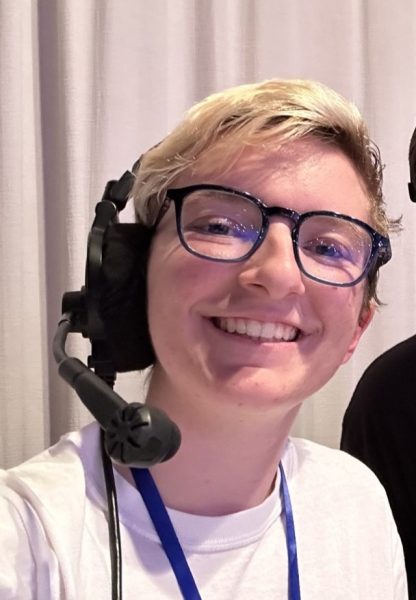
Emma has been involved in Ferris' journalism classes and clubs since sophomore year, and is now president of the Journalism Club. As a senior, she enjoys...

